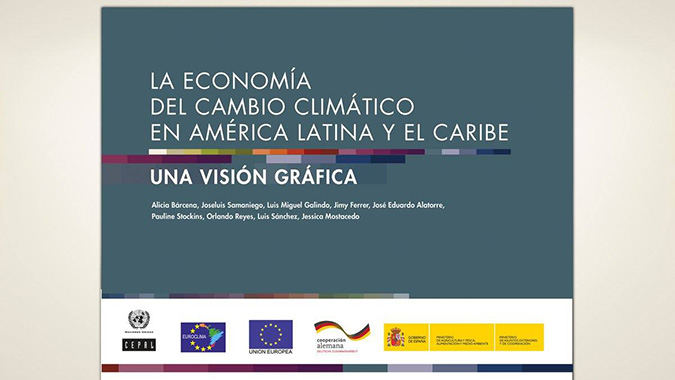New Publication Examines Nine Theses on Climate Change in Latin America and the Caribbean
Work area(s)
The report calls for moving toward more sustainable development through deep structural transformation.

Meeting the challenge of preserving a global public asset like the climate will require deep structural transformation from the current development style toward more sustainable development. This calls for a fair and inclusive international agreement that recognizes shared but differentiated responsibilities.
This is one of the perspectives set forth in the publication The Economy of Climate Change in Latin America and the Caribbean: a graphic vision, produced in the framework of the EUROCLIMA program, financed by the European Commission and coordinated by Alicia Bárcena, Executive Secretary of the Economic Commission for Latin America and the Caribbean (ECLAC).
The study examines nine theses on climate change in Latin America and the Caribbean, as well as seven climate change challenges in the region.
One point the document raises is that, despite the progress observed at the international level toward taking on the challenges of climate change and sustainable development, such as approval of the Sustainable Development Goals (SDGs), the Paris Agreement and the New Urban Agenda, there is a significant gap with regard to collective effort, and progress is still needed when it comes to the application of these agreements. This will require the formulation and implementation of specific public policies that enable a change of direction toward more sustainable development, along with a change in the structures of production and patterns of consumption consistent with a solution to the challenge of climate change.
Moreover, in view of the limitations and paradoxes of the current development style, ECLAC has advocated for a great environmental push toward transforming the current development paradigm. This must promote significant structural changes in order to pave a path of economic growth with consistently lower carbon levels in a context of greater equality and social inclusion.
The design and application of 21st-century public policies that simultaneously put economic, social and environmental development at their core, in the context of a global economy, is one of the great regional challenges, but it is also a great opportunity for meeting the challenge of development, according to the report.
The report asserts that it is essential that fair and inclusive international agreements based on multilateralism be formed, because these are the only durable way of preserving global public assets, such as our climate, and achieving global objections, such as the eradication of poverty. Shaping such agreements will require that we continue to seek overlapping interests both regionally and among countries, with international cooperation as a fundamental pillar.
The publication was presented by Alicia Bárcena on December 13, 2017 at the UN regional organization’s headquarters in Santiago, Chile, with comments from Marcelo Mena, Minister of the Environment, and Andrés Rebolledo, Minister of Energy. Chilean President Michelle Bachelet sent greetings via video.